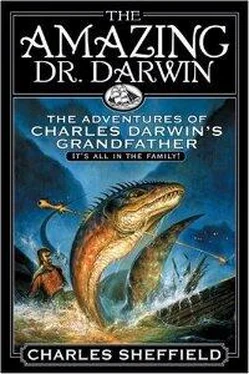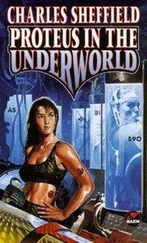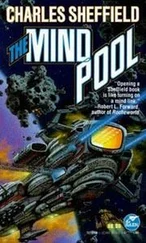“Never,” said Darwin promptly. He rubbed at his jaw, which was in bad need of a razor. “Have you been present when it happens? Or has anyone else?”
“Not I. She said that Mr. Faulkner was with her on one occasion, and Richard Crosse, who lodges with Mr. Faulkner, on another; but neither man saw or felt anything.”
“And the times and places?”
“The times, all different ones. The place, in her own room on the ground floor of Mr. Faulkner’s home in Saint Mary-le-Bow. I have been there myself. I felt nothing, nor did I see anything unusual.”
“But you did not think to consult your teacher, Dr. Warren.”
“I thought of it, yes. But you see, if Dr. Warren were to think that Florence were ill, he will also feel it is his responsibility to inform her parents. And they will insist that she return home at once for treatment—they do not understand what a fine doctor she has here. And if she goes to the Isle of Man, while I must stay…”
“I understand perfectly. But as to my possible role?”
“Sir, I am only a student. There are many ailments outside my experience. And Florence told me that you will be visiting Mr. Faulkner’s house tonight. You will see her. I thought, perhaps you will find a symptom in her invisible to me. If you would just take a look at her…”
“I will certainly look.” Darwin smiled ruefully. “Before my friend Colonel Pole makes the point for me, I must admit to my own weakness. Even without your adjuration, I could not help but look. Diagnosis is so ingrained in me, it is a way of life.”
“Thank you, sir.” Murchison relaxed visibly. “You see, she does not seem ill. Is there anything else that you can think of to explain her condition?”
“Nothing.” Darwin shook his head decisively. “I know no disease that provides such symptoms. But that is certainly not conclusive. In our knowledge of the human body, the best of us are no better than fumbling children. You may take comfort from this: feeling well is the best evidence I know of good health. If Florence continues to show no other symptoms than those that you describe, she should not worry. But I confess, I would certainly like to see—”
He was interrupted. An unshaven man carrying a lantern and dressed despite the cold only in dirty trousers and a thin blue shirt had come running into the inn. “Dr. Darwin!” he shouted to the room at large. “Is there a Dr. Darwin here?”
“There is.” Darwin began to stand up, groping under the table for his heavy walking stick. “Damn it, Jacob, can you get that for me? I’m not built for bending.” Then, to the man with the lantern. “I am Dr. Darwin. What do you want?”
“Emergency, sir.” The man was gasping for breath. “At the Exhibition by the Custom House. They sends me to look for you, and ask you to go there.”
Darwin looked quickly to Jamie Murchison, who shook his head. “No doing of mine, sir.”
“Then come with me. Perhaps you will have opportunity to add to your store of medical knowledge.” Darwin addressed the panting messenger. “I assume that someone at the Exhibition is ill?”
“No sir.” The ill-clad man was heading rapidly for the door, but he turned to show a somber face. “Someone is dead.”
Darwin and Murchison followed. Jacob Pole suddenly found himself alone at the table.
“Well, damn me,” he said. And then, to the whole room, “You see the way of it? They sit here, they talk and talk and eat and eat, enough for a dozen normal folk. I sit and listen.” He fished into his pocket and threw coins onto an empty platter. “Then they run and run—and guess who’s left alone at the end to pay the bill? Never trust a philosopher, my friends—he’ll pick your pocket fast as any magsman, and then explain how you’re lucky still to have your trousers.”
* * *
“Gout,” said Darwin, as they followed the lantern-bearing messenger through the fog-shrouded London streets.
The long, wan twilight of early February was near its end, and lamps were already burning in every house. It had snowed the day before, but the streets had been well cleared so that only grey mounds of slush remained. Now the yellow lamplight, bleeding out from tall, narrow windows, fell on the dull snow heaps and did more to emphasize their rounded shadows than to illuminate the pavement and road beyond.
Darwin banged his walking stick hard on the wet cobblestones. “Damnable gout, and damnable weather. Physician, heal thyself—but I have been unable to do so. I diagnose my condition, and I treat it well enough with cupping and with willow bark infusions, but I cannot cure it. Temperance helps, but this creeping cold brings it to life again. How much farther?”
“A few hundred yards.” Jamie Murchison resisted the urge to help Darwin. The other man was considerably overweight, and a little lame, but he was stumping along cheerfully and energetically. “We must walk along Eastcheap and Great Tower Street, sir, then south to the river. Half a mile at the most. Have you not visited the Exhibition yourself, Dr. Darwin? It has been the talk of London for these ten days.”
“I have not. Colonel Pole is your man for that—he plans a visit tomorrow. For my part, when someone tells of priceless jewels, and Persian demons, and Zoroastrian mysteries, I assume that it is merely an attempt to make a mumchance of the whole city.”
“But this is different, sir. The ruby is protected by a curse—and now it seems that the curse has shown its power.”
“We shall see. In a town full of calculating pigs, and dancing bears, and fire-eaters, and sword-swallowers, and purveyors of everything from Cathay aphrodisiacs to Indian opiates to French purges, anything may be claimed. For in my experience, London draws the charlatans of England, as a boil draws to it the body’s poisonous humors. Have you visited this Exhibition yourself, Mr. Murchison?”
“Yes, sir. Twice.” Murchison looked away to hide his embarrassment. “I went with Florence.”
“Then tell me what you saw. I am setting a bad example by my skepticism. In life, as in the examination of a new patient, one should keep the mind forever open for novelty of impression. Tell me all.”
“You will see it for yourself in another minute—we are almost there. But it is simple enough. Two weeks ago, the hall where the Exhibition resides was rented by a Persian, Daryush Sharani, for the purpose of displaying a magnificent ruby of vast age and religious significance. It is known as the Heart of Ahura Mazda, and it is huge—the size of a big man’s fist. But the thing that makes the Exhibition unique, and attracts so much public attention, is that although Sharani stays always with the gem, he disdains other guards. He insists that the Heart carries with it its own protection, in the form of a curse within the stone. The curse of Ahura Mazda invokes a demon, who binds and makes helpless anyone who touches the jewel. If that demon is not quickly banished by Daryush Sharani, the would-be thief will die.”
“Easy enough to say . Did anyone test the Persian’s claims?”
“They did, when the Exhibition began. With a hundred or more people watching, four men tried to take the jewel while Sharani stood by smiling. As soon as each one touched the stone, he was bound rigid until Sharani reached over the Heart of Ahura Mazda and whispered the invocation that controls the demon. Then the men were released. They looked dizzy, and in discomfort; but they moved freely enough.”
Murchison heard Darwin’s skeptical grunt. “I felt as perhaps you are feeling, sir,” he went on, “that it is easy enough to pay a poor man to stand still for a few minutes, and have him say that he was frozen by the curse. But one of the four was a nobleman, the Earl of Marbury, who is far beyond bribery and above corruption. He swore that as he tried to lift the Heart of Ahura Mazda he was seized by the demon, and unable to move a muscle until Sharani invoked the words of release. He also says that the demon’s grip is pure torment, unlike any pain that he had ever felt before.”
Читать дальше












